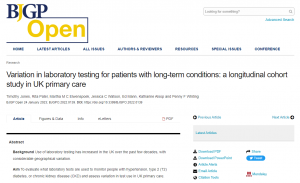Guidelines for routine blood tests may not align with testing rates
25 January 2023
Testing rates for routine blood tests don’t always align with guidelines for monitoring long-term conditions (LTC), according to a new study published in BJGP Open.
University of Bristol researchers, funded by NIHR ARC West, looked at nearly 1 million anonymised patient records and reviewed over 27 million tests. They found that testing rates vary considerably between GP practices, although they are no longer increasing as they had been in previous years.
Patients with LTCs usually get tested regularly to see if their disease is getting worse. Routine tests can also help a doctor assess how their patient is responding to treatment, and check for complications or side effects of the medications they are taking.
However, the study team found the frequency with which patients undergo these tests doesn’t always follow monitoring guidelines. This could be because the guidelines themselves aren’t always clear or easy to follow.
Researchers looked at the records of people registered with a GP in the UK between June 2013 and May 2018. In addition to being registered with a GP during this time, patients also had to be diagnosed with hypertension, type 2 diabetes or chronic kidney disease (CKD).
The study team found that kidney and liver function as well as full blood counts (a test to check the types and numbers of cells in someone’s blood) were being tested most. They also established that some tests weren’t being carried out as often as guidelines suggested, while others were being carried out more often than suggested.
Researchers believe that their results could reflect a lack of clarity or clear communication of the latest guidelines for monitoring long-term conditions. Without clear guidance, doctors may be ordering additional tests ‘just in case’.
Tim Jones, lead author, said :
“As well as being a potential source of waste, overuse of laboratory tests may be a source of harm. It has the potential to cause patient anxiety by asking them to undergo unnecessary tests, referrals, and overdiagnosis.”
“However, underuse of testing might miss important changes in somebody’s condition.
“We need to improve evidence around the most appropriate amount of testing for different conditions and find out how communication of guidelines can be improved.
“Monitoring of long-term conditions should be standardised in line with the latest evidence as this would provide greater consistency in access to monitoring tests.”
Paper
